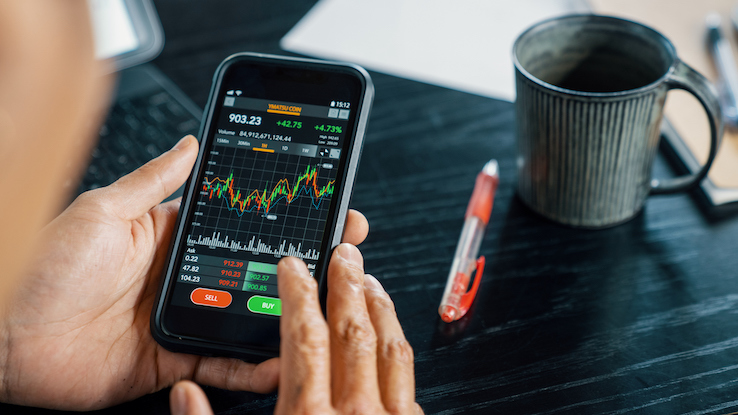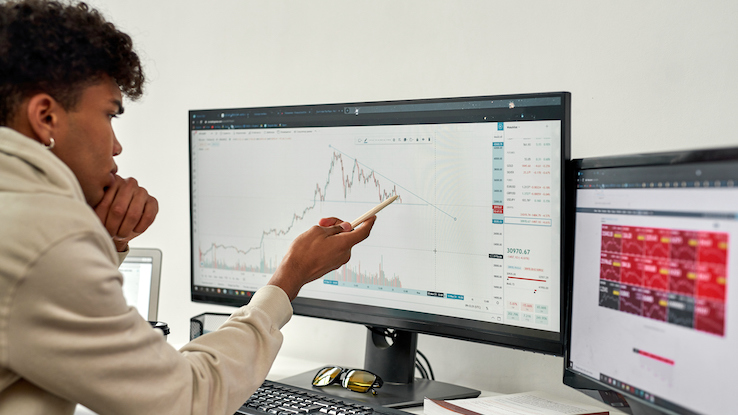
Cryptocurrency is becoming more mainstream every day, and it’s never been easier to get started participating in this space. It’s a straightforward process to sign up to one of the many crypto exchanges online today and make your first crypto purchase. However, there’s a bit more than that you’ll want to know before you can confidently invest your hard-earned money into these digital currencies. In this article, we’ll take you from what you need to know before investing in crypto all the way to tracking and managing your crypto portfolio in the future. Ready?
The Basics of Investing in Crypto
First things first; it’s important to understand some key things before you start investing. Perhaps the most essential is that you’ll need to learn how to tolerate a higher level of risk with these investments.
Bitcoin is the most popular and recognizable cryptocurrency in the world, and it gives a good representation of the typical fluctuations that a crypto coin goes through. Cryptocurrency is still a highly volatile investment — meaning its value doesn’t stay stable or predictable over time — with Bitcoin seeing fluctuations of 10% or more almost daily. This is why it’s important to allocate only a small percentage of your portfolio to it initially. This will give you a chance to become accustomed to the fluctuations that your crypto’s value will experience.
Unlike most banks, cryptocurrency isn’t FDIC insured. What this means is that, if an exchange shuts down, your wallet gets hacked (we’ll cover wallets later) or the exchange goes bankrupt, your money is gone and you have little hope of getting it back due to the anonymity inherent in crypto trades.
Any realized gains that you earn from cryptocurrency are taxable. Similar to any source of income, any money that crypto traders or investors make is taxable and must be declared to the IRS.
How to Choose a Cryptocurrency to Invest In
So, you know the risks and are familiar with the behavior of the crypto market, and you still want to invest. The safest way to buy crypto is through a centralized exchange. These are online platforms set up for profit by companies to make purchasing crypto as easy as possible. Companies like Coinbase, Crypto.com and Gemini are all well-known crypto exchanges where you can get started. Just be aware that these exchanges do charge fees that can eat into your profits.
You can buy crypto with a debit card, credit card, bank transfer or wire transfer on most exchanges. You can also set up a crypto wallet where you’ll store your crypto, and you can purchase crypto through the wallet as well. Wallets allow you to interact with a number of different platforms, like decentralized exchanges that can give you access to coins that aren’t available on centralized exchanges. Keep in mind that this comes with its own risks, as you could be investing in something that turns out to be a scam.

The cryptocurrency that you choose to invest in will depend on where you’ll be buying it, of course, but also on your own investment goals and interests. It’s always recommended to do your own research and choose the cryptocurrency that you’re interested in or believe in. Some of the most popular coins are Bitcoin, Ethereum, Dogecoin and Binance coin, but there are thousands to select, each with its own benefits and drawbacks.
Invest What You Can Afford
Cryptocurrency is risky, so it’s unwise to invest money you were planning to put towards your child’s college fund or a down payment on a house. You shouldn’t look at high-risk investments as a way of getting rich quick; instead, view them as a way to diversify your portfolio. Investing money that you can afford to lose is a good rule of thumb with crypto.
For example, investing 5 –10% of your entire portfolio is a reasonable amount for diversification. That way, the fluctuations of the crypto market won’t have your total portfolio value jumping up and down daily. If you’re a believer in the crypto market or a particular crypto coin, no one can stop you from going all-in on it, but acknowledge that you’ll probably lose some money — this strategy is essentially gambling. Listening to cryptocurrency podcasts is a great way to learn more about various coins and strategies that can hopefully maximize the money you gain.
How to Buy Crypto
As mentioned earlier, you’ll need to decide which crypto exchange you’ll buy your crypto from. This will determine your coin options and method of purchase. Again, for first-time investors, centralized platforms offer a much safer way of buying crypto, and you’ll pay a little extra for this peace of mind via the fees these platforms charge. Then, you’ll create and verify your account with the exchange. You probably won’t be able to buy or sell crypto before you’ve verified your identity to satisfy federal regulatory requirements.
To actually purchase crypto, you need to then deposit cash into the exchange account. Depending on the platform you choose, you can do this with your debit or credit card, or via a bank or wire transfer. You may have to wait a few days for the funds to clear before you can get started buying. Do not buy crypto with a credit card; many banks see crypto purchases as cash advances and charge extra fees accordingly.

Once you have money in your account, you can place your first crypto order. Once this is finished, you then have to choose a storage method for your new digital currency. There are a couple of options here; you can either leave it in the exchange account, which is the easiest option, or transfer it to a hot or cold wallet.
Simply put, hot wallets are stored online, and cold wallets are stored offline on something like a USB drive. Each comes with its own benefits, and it’s up to you what option you feel most comfortable with.
How to Manage Your Crypto Portfolio
Keep an eye on your crypto investments over time. They’re not guaranteed to appreciate. One easy way to do this is to enter your crypto investments onto a main investing dashboard like Personal Capital. Stay up to date on the status of the crypto market by reading the news and tracking your coins regularly.
Unlike other investments, cryptocurrency isn’t something you can set and forget, and anything can happen on a given day that might make its value plummet or soar. This is why it’s smart to continue to educate yourself on crypto and actively check your portfolio.





